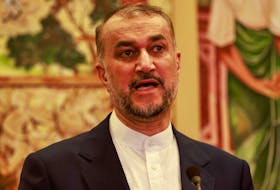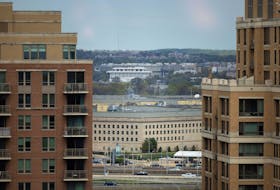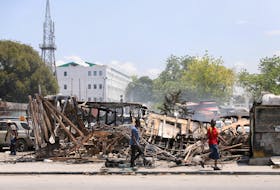MADRID (Reuters) - Spain's acting prime minister Pedro Sanchez on Friday proposed two Catalan lawmakers as parliamentary speakers, giving an early sense of the prominent role the politically volatile region is likely to play during his mandate.
The crisis triggered when Catalonia briefly declared independence in 2017 was a central issue in last month's national election, and its separatist ambitions are proving a political headache for Sanchez as his minority Socialist Party seeks to form a government.
Both Meritxell Batet, Sanchez's candidate to be lower house speaker, and senate pick Manuel Cruz belong to the Socialists' Catalan wing. As such, they favor continued union with Spain but also open dialogue with the region's pro-independence camp.
Their nomination as key links in the national legislative process demonstrates "commitment to dialogue, to coexistence and to cohesion among all Spaniards," acting government spokeswoman Isabel Celaa told reporters.
But in a sign of how divisive the debate over Catalonia is, a leading separatist suggested it was merely papering over the cracks.
"We don't think that putting Catalans in these positions fixes anything. It is a cosmetic operation," Sergi Cabrera, a spokesman for the ERC party in the region's parliament said.
What his party wanted was a permanent structure for dialogue between Madrid and Barcelona on Catalan issues.
Sanchez, who is seeking to serve a second term, has made overtures over the past year to establish dialogue with Catalonia and give it a greater degree of autonomy. But he has ruled out another independence vote in the region.
Spain's then conservative government briefly took over administration of the region after the 2017 referendum was declared illegal by Spanish courts.
"Sanchez leaves nothing to chance, he is a person of consensus who is open to maintaining contacts with different political parties," said Antonio Barroso, managing director of political consultancy Teneo.
To be sworn in again as prime minister, he will need the support of other leftist parties plus at least one vote or abstention from Basque or Catalan nationalist parties.
In another sign of tension, on Thursday the pro-independence Catalan parliament had blocked the nomination to the senate of the Catalan Socialists' leader Miquel Iceta, who was Sanchez's first choice to lead the upper house.
As opposed to Iceta, Batet and Cruz are already elected lawmakers and do not need the backing of the Catalan parliament. The Socialists have a majority in the senate, meaning Cruz is certain to lead the chamber. Batet's nomination will require backing from other parties.
As head of Spain's regional administration, Batet was directly in charge of contacts with the pro-independence Catalan government.
Alejandro Quiroga, reader in Spanish History at the University of Newcastle, said Sanchez's plan to stick to nomination Catalan speakers after the setback on Iceta is a "way of not wanting to let anyone else set your political agenda while continuing to reach out."
(Reporting By Belen Carreno and Jesús Aguado; Editing by Ingrid Melander and John Stonestreet)









